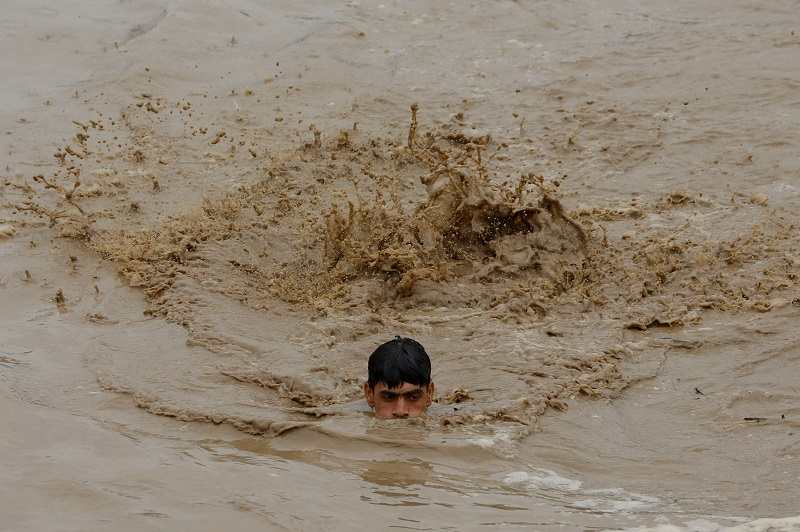
A man swims in flood waters while heading for a higher ground, following rains and floods during the monsoon season in Charsadda, Pakistan August 27, 2022.
12:02 JST, August 28, 2022
PESHAWAR/KABUL (Reuters) – Tens of thousands of people fled their homes in northern Pakistan on Saturday after a fast-rising river destroyed a major bridge, as deadly floods cause devastation across the country.
Powerful flash floods in the northern province of Khyber Pakhtunkhwa caused the Kabul River to swell, sweeping away a large bridge overnight, cutting off some districts from road access.
Downstream, fears of flooding around the river banks prompted around 180,000 people in the district of Charsadda to flee their homes, according to disaster officials, with some spending the night on highways with their livestock.
Historic monsoon rains and flooding in Pakistan have affected more than 30 million people over the last few weeks, the country’s climate change minister said, calling the situation a “climate-induced humanitarian disaster of epic proportions.”
The military has joined the country’s national and provincial authorities in responding to the floods and Pakistan’s army chief on Saturday visited the southern province of Balochistan, which has been hit heavily by the rains.
“The people of Pakistan are our priority and we won’t spare any effort to assist them in this difficult time,” said army chief General Qamar Javed Bajwa.
Pakistani leaders have appealed to the international community for help and plan to launch an international appeal fund. The foreign affairs ministry said Turkey had sent a team to help with rescue efforts.
“The magnitude of the calamity is bigger than estimated,” said Prime Minister Shehbaz Sharif, in a tweet, after visiting flooded areas.
In neighboring Afghanistan, the Taliban administration also appealed for help after flooding in central and eastern provinces.
The death toll from floods this month in Afghanistan had risen to 192, disaster authorities said. Thousands of livestock had been killed and 1.7 million fruit trees destroyed, raising concerns over how families would feed themselves going into the cooler months while the country deals with an economic crisis.
“We ask the humanitarian organizations, the international community and other related organizations and foundations to help us,” Sharafudden Muslim, the deputy director of Afghanistan’s disaster ministry, said at a press conference, adding more than a million families required assistance.
Top Articles in News Services
-

Survey Shows False Election Info Perceived as True
-

Hong Kong Ex-Publisher Jimmy Lai’s Sentence Raises International Outcry as China Defends It
-

Japan’s Nikkei Stock Average Touches 58,000 as Yen, Jgbs Rally on Election Fallout (UPDATE 1)
-

Japan’s Nikkei Stock Average Falls as US-Iran Tensions Unsettle Investors (UPDATE 1)
-

Trump Names Former Federal Reserve Governor Warsh as the Next Fed Chair, Replacing Powell
JN ACCESS RANKING
-

Producer Behind Pop Group XG Arrested for Cocaine Possession
-

Japan PM Takaichi’s Cabinet Resigns en Masse
-

Japan Institute to Use Domestic Commercial Optical Lattice Clock to Set Japan Standard Time
-

Man Infected with Measles Reportedly Dined at Restaurant in Tokyo Station
-

Israeli Ambassador to Japan Speaks about Japan’s Role in the Reconstruction of Gaza






















